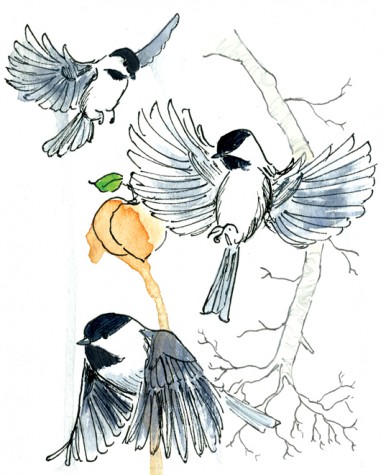
Gabriel Fried
POETRY-April 2012
Poem by Gabriel Fried
Edited by Gibson Fay-LeBlanc
Artwork by Hannah Rosengren
Melt, 2012, watercolor and ink on paper, 5.5″ x 4″
“Colony Collapse Disorder”
Along Route 1, the youth of Maine have cocked
their heads to hear the swarm of spring approach
on trucks from California’s almond farms.
It’s April, and New England kicks about
ideas of thaw. It’s early to expect
commitment this far north, but there is mud
and gravel everywhere for now: post offices
and pantries can’t be mopped up fast enough
for what comes in on duck boots and galoshes.
And it’s the same on 7 in Vermont
and 9G in New York—or so they claim,
though no American winter is like Maine’s,
that mixture of ocean salt and hoarfrost.
The children cock their heads but nothing comes,
while across Georgia, peaches are withheld,
words forgotten on the lips of blossoms.
This will be the silent summer. No buzz
will hover vibrantly. No tractors will
exhale a galaxy of pesticide,
groaning like widowers who frequent cliffs
above the quarry or bars on Smith Street.
The silence makes a sting most hearts were forced
to borrow from the old legends: those of
unincorporated orchards, sandlots,
and ghost-towns. Once school is out, the children
will sweat sweetly in the luscious, fruitless
fields they comb through, glistening like a city
of decent posture and useful mischief.
Theirs will be a different, better sting,
an ache for what is present, not what’s past;
for what is racing ’round us, sticking close,
humming like a hidden bell of home.
__________
Maine magazine works in conjunction with students at the Maine College of Art. Illustration major Hannah Rosengren says of “Colony Collapse Disorder”: “I interpreted this poem as being about transition. As a Maine native I could easily picture the muddy fields and the approach of spring.”
Gabriel Fried on “Colony Collapse Disorder”: “I’d seen a documentary on colony collapse disorder—that eerie syndrome that causes afflicted bees to lose their homing impulse. I became fascinated by its tidal-wave impact beginning in the west and making its way east. You can’t get farther east than Maine.”
